December 11, 2007
The House Ear Institute (HEI) announced it has recruited Marco Giovannini, MD, PhD, to head the department of neural tumor research that will be located in its new Wallis Annenberg Research Center. HEI reports Giovannini was chosen to lead this new area of research based on his reputation as a scientific researcher as well as pas accomplishments and publications in Neurofibromatosis Type II (NF2) tumor research and its molecular genetics.
The report from HEI indicates Giovannini will bring a team of scientists from his research lab at the University of Paris VII, France, to the HEI to pursue investigations of NF2, a genetic disease with an incidence rate of 1 in 25,000 people characterized by bilateral tumors growing on the balance and hearing nerves.
A native of Italy, Giovannini most recently served as Director of the Functional Genomics and Tumor Research Laboratory at the University of Paris VII in France and as chief scientific officer at NexGenix Pharmaceuticals in Burlingame, California. Giovannini will assume his post at the House Ear Institute in early 2008, at which time his lab will be completely operational with state-of-the-art equipment. A news release from HEI stated as head of Neural Tumor Research, Giovannini will develop an integrated NF2 platform for screening novel drug agents in controlled preclinical studies to develop new therapies for the tumors that arise in individuals with NF2. The preclinical studies will be integrated with clinical trials of the agents that have the greatest likelihood of success for patients with NF2.
Giovannini has developed several NF2 mouse models for these studies in his INSERM (French National Institute of Health and Medical Research) laboratory in Paris, France and through international collaborative efforts, according to HEI. Giovannini and his team will work closely with William Slattery, III, MD, and staff in HEI’s clinical studies department on trial management, subject selection and recruiting, as well as statistical analysis and interpretation of results. These studies will utilize the NF2 clinical resources of the House clinic and its auditory brainstem implant (ABI) program co-headed by Derald Brackmann, MD, and will be partially funded through the Caroline C. Levine Fund for NF2 Research established in honor of Brackmann.
"I’ve had a long association with the House Ear Institute in my research and I’m very pleased to be joining the scientific staff of this organization where both management and scientists are dedicated to advancing hearing science with the highest quality of research," Giovannini says. "The Institute’s reputation for hearing and NF2 research is second to none and I’m very excited to become a part of its rich history of achievements."
"Dr. Giovannini’s track record of excellence as a researcher in the area of tumor suppressors and his knowledge of Schwann cells as they relate to tumor growth in NF2 is of particular interest to us," says Jim Boswell, chief executive officer. "We are confident that bringing Dr. Giovannini and his top-caliber research team on board at the Institute will help us achieve our goals in discovering better treatments for NF2 patients and others with genetic hearing disorders."
HEI reports Giovannini earned his medical degree at the University of Bologna, Italy, and a doctorate in molecular pathology. He has worked in the molecular genetics laboratory at the Salk Institute for Biological Studies in La Jolla, CA, and is a member of several scientific societies and study sessions including the French and the American Associations for Cancer Research. He has won numerous awards for his work, including the Prix Olga Sain de la Ligue Nationale for Contre le Cancer. He has published extensively in his area of expertise, with articles appearing in the Journal of Clinical Investigation, Cancer Research and Genes & Development, among others. In recognition of his leadership in the field of neurofibromatosis, Giovannini has been invited to chair several workshops and scientific meetings including the International Consortium for the Molecular and Cell Biology of NF1 and NF2.
Source: House Ear Institute




